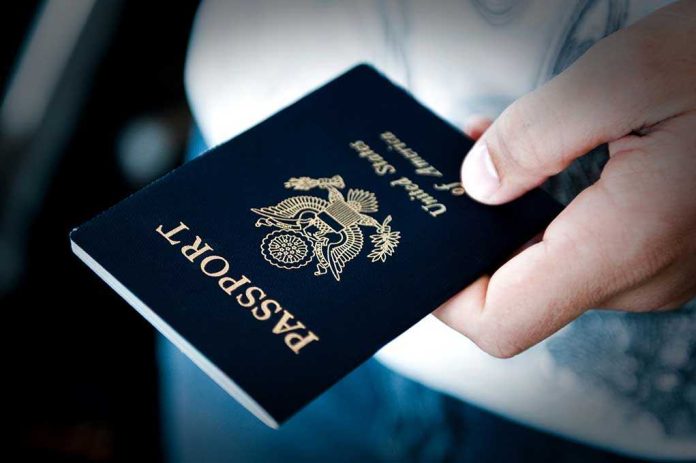
What happens when the highest court in America tells a segment of its citizens that the gender on their passport must be determined by paperwork, not by identity? The answer: a legal and cultural crossroads with consequences far beyond airport security lines.
Story Snapshot
- The US Supreme Court allowed enforcement of a Trump-era policy requiring passport sex markers match birth certificates, not gender identity.
- This ruling reverses Biden and Obama administration changes that had enabled gender marker flexibility and “X” options for non-binary people.
- Advocacy groups label the policy discriminatory, pledging to keep fighting for transgender and non-binary rights in federal documentation.
- The decision’s ripple effects touch travel, civil rights, and the ongoing national debate over gender identity in public life.
Supreme Court Decision Reshapes Federal Identity Policy
The Supreme Court’s 6-3 decision on November 6, 2025, cemented a Trump administration directive: all US passports must list the sex assigned at birth, as shown on the holder’s birth certificate. This ruling blocks transgender and non-binary Americans from reflecting their lived identities or selecting the “X” marker on federal travel documents. Just four years earlier, the Biden administration introduced that “X” marker, opening the door for non-binary recognition at the border. Now, the policy reversal is immediate, sweeping, and, for many, deeply personal.
US supreme court lets Trump block passport sex markers for trans and non-binary people https://t.co/RqhicaaTKe
— Shirley Jenkins (@YourHoodLawyer) November 6, 2025
The ramifications extend far beyond bureaucratic formality. Passports are more than travel papers; for many, they are lifelines to dignity, safety, and self-determination. Under the new rule, anyone whose gender presentation doesn’t match their passport risks confusion, harassment, or worse—from airport security to foreign customs. Legal challenges erupted within days of the rule’s reinstatement, but the Supreme Court’s decision means the policy will remain in force while lawsuits wind through the lower courts.
From Inclusion to Restriction: A Timeline of Policy Change
For over a decade, the journey of passport gender markers in America has mirrored the nation’s evolving understanding of gender. In 2010, the State Department began letting transgender Americans amend their passport sex marker with medical documentation. The Biden administration’s 2021 reforms expanded this to include an “X” for non-binary people, aligning with international trends and advocacy group recommendations. But on January 20, 2025, the Trump White House reversed course, mandating that every passport revert to the sex listed on the birth certificate. Lawsuits followed, leading directly to the November 2025 Supreme Court showdown.
The decision lands amid a broader climate of legislative and judicial battles over LGBTQ+ rights. Multiple states have passed laws curbing access to gender-affirming care and identification. The passport policy is now emblematic of a national divide over whether identity should be defined by personal truth or government decree.
Stakeholders Clash Over Security, Rights, and Recognition
Each side frames the debate through a starkly different lens. The Trump administration asserts that uniform documentation is essential for security and fraud prevention. Supporters argue that a birth certificate is an objective legal record, and federal documents should match it for clarity and accountability. Conservative legal voices say this approach preserves document integrity and upholds statutory requirements.
Advocacy organizations, led by the ACLU and LGBTQ+ groups, see the ruling as a direct attack on civil rights. They argue that denying transgender and non-binary people accurate identification is not only demeaning but dangerous, exposing them to discrimination and travel hazards. In their words, the policy is “an unlawful attempt to dehumanize, humiliate, and endanger” a vulnerable population. These organizations have vowed to continue their legal fight, insisting that the Constitution protects the right to self-identify—on paper and in life.
Unfolding Impacts: From Personal Risk to National Debate
Short-term consequences are already emerging. Affected individuals face immediate barriers: international travel, job applications, and daily encounters now carry new risks if their presentation diverges from official documents. Stories are surfacing online and in advocacy circles about missed flights, denied visas, and invasions of privacy. For those who had already changed their passport markers, the policy means reverting to an identity that no longer fits, on pain of federal noncompliance.
Long-term, the policy sets a precedent that could embolden further rollbacks of LGBTQ+ rights at federal and state levels. The travel and tourism industries may see decreased participation from affected groups, while the US risks falling out of step with allies that have adopted more inclusive identification standards. The ruling has energized political activism on both sides, ensuring that the conversation over who gets to define “identity” in America will remain fierce—and far from settled.







